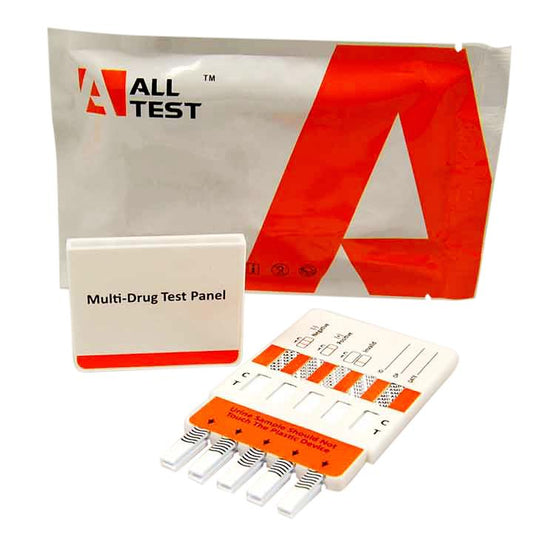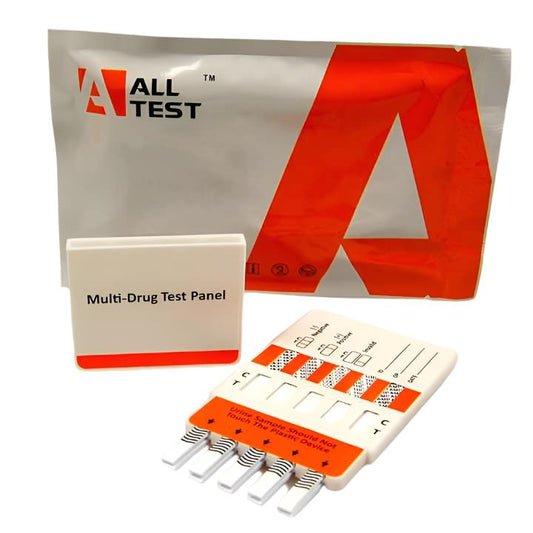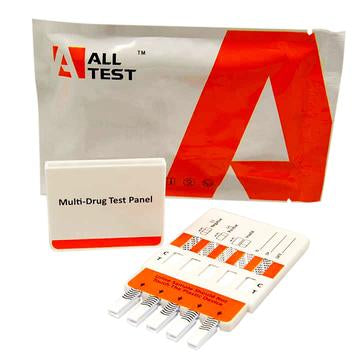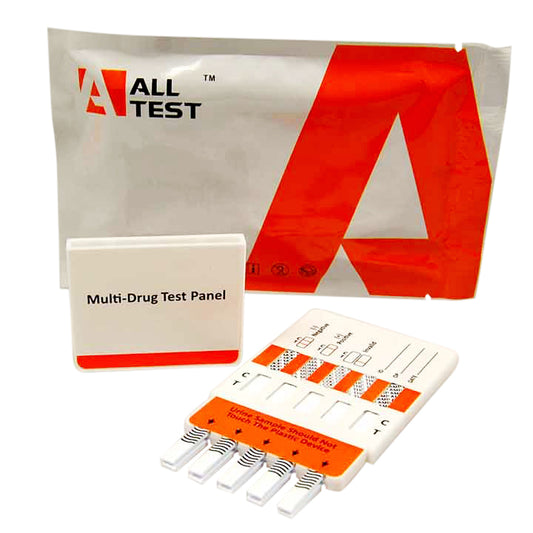Collection: THC Cannabis Urine Tests
-
ALLTEST 7 Panel Ultra Sensitive New Club Drugs Urine Multi Drug Test Kit
No reviewsRegular price From £3.45 GBPRegular priceUnit price / per -
ALLTEST Festival Urine Multi Drug Test Kit 5 Panel
No reviewsRegular price £2.99 GBPRegular priceUnit price / per -
Wholesale ALLTEST Club Drug 5 Panel Urine Multi Drug Test Kit
No reviewsRegular price From £976.31 GBPRegular priceUnit price / per
THC urine tests to detect Cannabis use
THC (tetrahydrocannabinol) is the primary psychoactive component of cannabis, and its presence in urine is often tested to detect recent cannabis use. Cannabis urine tests are commonly used in workplaces, schools, and sports to ensure individuals are not using cannabis or other drugs that may impair their performance or judgment.
Urine tests for THC typically use an immunoassay, which is a biochemical test that detects the presence of a specific substance in a sample. The test works by using antibodies that are designed to bind to THC metabolites, which are produced when the body breaks down THC after it is ingested. If the urine sample contains THC metabolites, the antibodies will bind to them, producing a measurable signal that indicates a positive result.
There are different types of THC urine tests available, including the dipstick test, which is a quick and easy test that can be done in a doctor's office or at home. This type of test involves dipping a strip of paper into a urine sample and waiting for a few minutes for the results. Another type of test is the laboratory-based urine test, which is more accurate and reliable than the dipstick test. This test involves sending a urine sample to a laboratory, where it is analyzed using more sophisticated techniques.
It's important to note that THC urine tests can detect the presence of THC metabolites in urine for several days or even weeks after cannabis use, depending on the frequency and amount of use. This means that even if a person has not used cannabis recently, they may still test positive on a urine test. Additionally, urine tests do not measure impairment, meaning that a positive result does not necessarily indicate that the individual is under the influence of cannabis at the time of testing.
How long after Cannabis use can THC be detected in urine?
The detection window for THC in urine depends on various factors such as frequency and amount of use, metabolism, and individual differences. Generally, THC metabolites can be detected in urine for several days to several weeks after the last use of cannabis. For infrequent cannabis users, THC can typically be detected in urine for up to three days after use. For regular cannabis users, THC metabolites can be detected in urine for up to a month or even longer after the last use. Heavy or chronic cannabis users may have detectable THC in their urine for up to 90 days after the last use.
It's important to note that THC can be detected in different parts of the body for different lengths of time. For example, THC can be detected in blood and saliva for a shorter period than in urine, typically up to 24 hours after use. Additionally, THC can be detected in hair samples for months after use, although hair testing is less common than urine testing. It's also important to note that urine tests for THC can occasionally produce false positives (very rare) or false negatives. Factors that can affect the accuracy of the test include the type of test kit used, the sensitivity of the test, and the presence of other compounds that can interfere with the test results.
THC urine tests are commonly used to detect recent cannabis use and are often used in workplaces, schools, and sports to ensure individuals are not using drugs that may impair their performance or judgment. However, it's important to note that these tests can detect THC metabolites in urine for several days or weeks after use, and a positive result does not necessarily indicate impairment at the time of testing.
What does an extremely faint line on a drug test for thc mean?
An extremely faint line on a THC drug test can be confusing, but it generally should be interpreted as a negative result although it could also mean that the test has detected a very small amount of THC or its metabolites in the sample.
What Does a Faint Line Mean?
- Negative Result: In most drug tests, even a faint line in the test (T) area is still considered a negative result. The presence of a line, no matter how light, indicates that the THC concentration is below the test's cutoff level.
- Positive Result: If no line appears in the test (T) area while the control (C) line is visible, the test is positive for THC.
Why Is the THC drug test line so faint?
Several factors can contribute to a faint line, including:
- Low THC levels: The person may have a very small amount of THC or its metabolites in their system.
- Diluted urine: Drinking a lot of water before the test can dilute THC levels which may alter the result.
- THC drug test sensitivity: Some THC drug tests have different cutoff levels (e.g., 50ng/mL or 20ng/mL). Lower cutoff levels detect smaller amounts of THC.
- Metabolism & usage: Occasional users may clear THC faster while frequent users take longer to eliminate THC.
- Expired or faulty test kit: If the test is old or not stored properly, it might not work correctly.
Next Steps
- Retest if unsure: If the THC drug test results are unclear, retaking the test with a fresh urine sample can help confirm.
- Wait & test again: THC takes time to leave the body, so waiting a few days and testing again may produce a clearer result.
- Lab confirmation: If an important decision depends on the result (e.g., employment, legal matters), a lab-based drug test (such as GC-MS) can provide more accuracy.
The length of time THC (tetrahydrocannabinol) stays in the body and is detectable on drug tests depends on several factors, including frequency of use, metabolism, body fat percentage, and the type of drug test used.
Detection times for THC by drug test type
Different drug tests have varying detection windows for THC:
| Test Type | Detection Window |
|---|---|
| Urine Drug Test | 1–3 days (occasional use) 7–21 days (regular use) 30+ days (heavy/chronic use) |
| Blood drug Test | 1–2 days (occasional use) Up to 7 days (heavy use) |
| Saliva Drug Test | Up to 24 hours (occasional use) 1–3 days (heavy use) |
| Hair Drug Test | Up to 90 days (chronic use) |
Factors that affect THC detection on a drug test
1) Frequency of Use
- Occasional Users (1–2 times per week) may test negative within a few days.
- Regular Users (3–5 times per week) may test positive for 1–3 weeks.
- Heavy Users (daily or near-daily) can test positive for over a month, especially in urine tests.
2) Metabolism & Body Fat
- THC is stored in fat cells, so people with higher body fat percentages may retain THC longer.
- Faster metabolism helps clear THC more quickly.
3) Hydration & Diet
- Drinking plenty of water does not instantly flush THC but may slightly lower concentrations in urine.
- High-fat meals may slow THC metabolism.
5) Type of drug test & sensitivity of the test
- Standard urine THC tests usually detect THC at a 50 ng/mL cutoff level.
- More sensitive drug tests (e.g., 20 ng/mL) can detect THC for longer periods.
How to Speed Up THC Elimination
- Exercise: Increases metabolism, but intense workouts may temporarily release stored THC back into the bloodstream.
- Hydration: Helps the body process and eliminate toxins but doesn’t drastically speed up THC removal.
- Healthy Diet: A balanced diet supports liver function, which is responsible for breaking down THC.
Would you like guidance on how to interpret a specific THC drug test result for one of the THC drug test kits that we have supplied? Contact our customer support team via chat during our office hours, and they will be happy to assist you.




